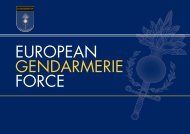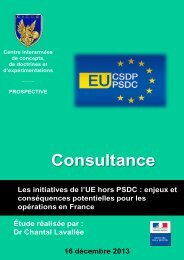Conference
science-research-bulletin-2013-conference
science-research-bulletin-2013-conference
You also want an ePaper? Increase the reach of your titles
YUMPU automatically turns print PDFs into web optimized ePapers that Google loves.
EUROPEAN POLICE SCIENCE AND RESEARCH BULLETIN<br />
SPECIAL CONFERENCE EDITION<br />
NEW APPROACHES TO COMPARE POLICE<br />
PRACTICE IN EUROPE: AN OCCUPATIONAL<br />
HEALTH PERSPECTIVE ( 1 )<br />
Mariana Kaiseler<br />
UK<br />
Cristina Queirós<br />
Portugal<br />
Susana Rodrigues<br />
Portugal<br />
Keywords: police work; stress; comparative studies; ambulatory method.<br />
Abstract: Police work is a particular stressful occupation. Exposure to stressors everyday impairs physical<br />
and psychological health and can impact the welfare of citizens. It seems crucial to further understand<br />
stress among police officers in order to have proactive and healthy European police force. Despite this<br />
need, previous research on Police stress has been impaired by several problems. These include relying<br />
largely on self-report measures, retrospective biases, and cross sectional designs, failing to address<br />
within-person variations. Police forces in most European countries face nowadays extremely challenging<br />
times due to a combination of factors, including open borders, drug trafficking, terrorism, multicultural<br />
diversity and the overall use of new technologies in contemporary life (Benyon, 1994; Oakley, 2001).<br />
Hence, there is an urgent need to conduct comparative occupational health studies among police<br />
forces in Europe, allowing the development of knowledge in this area and the dissemination of best<br />
practices to tackle police stress and foster police health and well-being. Despite this need, little work<br />
has been conducted, mainly due to a variety of reasons discussed in this paper that are likely to emerge<br />
when conducting European comparative studies on police. In an attempt to overcome some of these<br />
challenges, recommendations are provided and particularly an innovative interdisciplinary research<br />
method developed in the SCOPE project is described. Findings of this research will impact theoretical<br />
and applied knowledge in the area of police occupational health. Finally, this seems to be a promising<br />
research method to use in future comparative occupational health studies among police forces in Europe.<br />
1. INTRODUCTION<br />
Police work is a particular stressful occupation<br />
(McCarty, Zhao, & Garland, 2007). Police officers<br />
on their daily duties have not only to take care<br />
of themselves but also assure the safety of the<br />
public and still be able to keep their emotions<br />
and reactions under control. As a consequence<br />
of the demanding occupation, several physical<br />
and psychological health problems can occur,<br />
with impact on the welfare of officers and<br />
citizens. This exposure of police officers to<br />
potential stress sources over time has been<br />
associated with several problems (Kop, Euwema,<br />
& Schaufeli, 1999, Violanti & Paton, 2006),<br />
affecting not only behavioural (i.e. absenteeism,<br />
poorer interactions with the public, fatigue,<br />
attitude towards the use of violence; excessive<br />
drinking and smoking), but also physical (i.e.<br />
cardiovascular diseases, digestive problems),<br />
and psychological components (i.e. increased<br />
( 1 ) Acknowledgments: Thanks to Prof. João Paulo Cunha (INESC TEC/ FEUP) and Prof. Ana Aguiar (FEUP) for their important<br />
contribution in the development of the SCOPE interdisciplinary method. Additionally thanks to Polícia de Segurança Pública<br />
(PSP), Portugal for collaborating in the SCOPE project research.<br />
This research has received funding from the European Union Seventh Framework Programs ([FP7/2007-2013] [FP7/2007-<br />
2011]), under the SCOPE project Grant Number [PCIG10-GA-2011-303880], the Future Cities Project — FP7 Capacities,<br />
Grant Number 316296, and from FCT, Portugal (DFRH/BI/51845/2012).<br />
139





